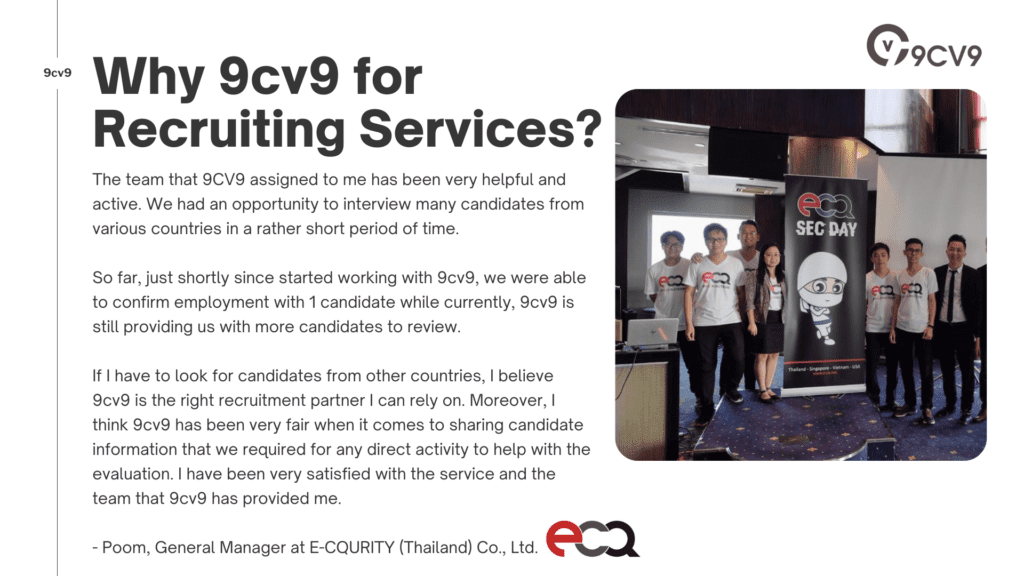Key Takeaways
- Navigate South Korea’s tech hiring landscape with confidence using our step-by-step guide tailored for 2024, ensuring you attract top talent efficiently.
- Master cultural nuances and legal intricacies to streamline the hiring process, fostering a positive work environment and retaining tech talent effectively.
- Stay ahead in South Korea’s competitive tech industry by leveraging innovative recruitment strategies and continuous learning opportunities outlined in our comprehensive guide for 2024.
In the bustling landscape of South Korea’s technology sector, where innovation meets tradition, navigating the intricacies of talent acquisition can be both a daunting task and a rewarding journey.
As we step into 2024, the demand for skilled tech professionals continues to surge, propelled by the country’s steadfast commitment to technological advancement and its position as a global leader in innovation.
For businesses seeking to thrive in this dynamic environment, mastering the art of tech hiring is not just a necessity but a strategic imperative.

South Korea’s tech industry, characterized by its vibrant startup ecosystem, powerhouse conglomerates, and government support for research and development, presents a wealth of opportunities for those looking to tap into its talent pool.
However, amidst this abundance lies the challenge of identifying, attracting, and retaining top-tier tech talent—a challenge that demands a nuanced understanding of the local market dynamics, cultural nuances, and regulatory landscape.
In this comprehensive guide, we delve deep into the intricacies of tech hiring in South Korea, offering a meticulously crafted roadmap to navigate every step of the recruitment journey with confidence and precision.
Whether you’re an established multinational corporation expanding your presence in the region or a burgeoning startup seeking to make your mark, this guide is your trusted companion in the quest for talent excellence.
From decoding the nuances of South Korea’s tech job market to crafting compelling job descriptions, leveraging the right recruitment channels, conducting culturally sensitive interviews, and navigating the intricacies of the hiring process, each chapter is designed to equip you with the knowledge and strategies needed to succeed in your talent acquisition endeavors.
Moreover, as we venture into the future, we shine a spotlight on best practices for retaining tech talent, recognizing that the true measure of success lies not only in recruitment but in fostering a culture of growth, innovation, and inclusivity.
At its core, this guide is more than just a compilation of strategies and tactics; it’s a testament to our unwavering commitment to driving excellence in tech hiring and fostering a thriving ecosystem where talent and opportunity converge.
So, whether you’re a seasoned HR professional, a hiring manager, or an entrepreneur with a vision, join us on this transformative journey as we unlock the secrets to successful tech hiring in South Korea and pave the way for a future defined by innovation, collaboration, and limitless possibilities.
Before we venture further into this article, we like to share who we are and what we do.
About 9cv9
9cv9 is a business tech startup based in Singapore and Asia, with a strong presence all over the world.
With over eight years of startup and business experience, and being highly involved in connecting with thousands of companies and startups, the 9cv9 team has listed some important learning points in this overview of Tech Hiring in South Korea in 2024.
If your company needs recruitment and headhunting services to hire top-quality employees, you can use 9cv9 headhunting and recruitment services to hire top talents and candidates. Find out more here, or send over an email to [email protected].
Or just post 1 free job posting here at 9cv9 Hiring Portal in under 10 minutes.
Tech Hiring in South Korea: A Useful Step-By-Step Guide in 2024
- Understanding the South Korean Tech Job Market
- Preparing for Tech Hiring in South Korea
- Crafting Effective Job Descriptions
- Leveraging Job Portals and Recruitment Channels
- Conducting Interviews and Assessments
- Navigating the Hiring Process
- Best Practices for Retaining Tech Talent
1. Understanding the South Korean Tech Job Market
Overview of South Korea’s Tech Landscape
- Rapid Technological Advancements: South Korea stands at the forefront of technological innovation, with its tech sector experiencing exponential growth driven by advancements in areas such as artificial intelligence (AI), blockchain, and biotechnology.
- Government Support: The South Korean government has been instrumental in fostering the growth of the tech industry through initiatives like the Korean New Deal, which aims to invest in digital infrastructure and create a digital-savvy workforce.
- Thriving Startup Ecosystem: South Korea boasts a vibrant startup ecosystem, with hubs like Seoul’s Silicon Valley and Pangyo Techno Valley attracting both domestic and international entrepreneurs. Startups like Coupang, Kakao, and Woowa Brothers have garnered global attention for their innovative solutions.

Major Tech Hubs and Companies
- Seoul: As the capital and economic hub of South Korea, Seoul is home to a myriad of tech companies, ranging from multinational giants to agile startups. Examples include Samsung Electronics, LG Electronics, and Naver Corporation.
- Pangyo Techno Valley: Located just south of Seoul, Pangyo Techno Valley has emerged as a hotbed of innovation, housing over 1,200 tech companies and startups. It is often dubbed the “Silicon Valley of South Korea” and is known for its collaborative ecosystem and access to cutting-edge research facilities.
- Daejeon: With its concentration of research institutes and government-funded R&D centers, Daejeon has become a hub for technology and science. Companies like Korea Aerospace Industries and Hanwha Systems have a significant presence in the city.

Trends and Growth Projections in the Tech Sector
- AI and Machine Learning: South Korea is heavily investing in AI and machine learning technologies, with applications ranging from autonomous vehicles to healthcare diagnostics. Companies like SK Telecom are pioneering AI-driven solutions to enhance customer experiences and streamline operations.
- 5G Technology: The rollout of 5G infrastructure has unlocked new possibilities in areas such as augmented reality (AR), virtual reality (VR), and the Internet of Things (IoT). Telecom giants like KT Corporation and LG Uplus are leading the charge in deploying 5G networks nationwide.
- Green Technology: With increasing focus on sustainability and environmental conservation, there is growing demand for green technology solutions in South Korea. Companies like Hanwha Solutions are developing renewable energy solutions such as solar power and energy storage systems.
Summary:
In conclusion, understanding the nuances of South Korea’s tech job market is essential for businesses and professionals seeking to thrive in this dynamic landscape.
With its rapid technological advancements, supportive government policies, and flourishing startup ecosystem, South Korea offers a wealth of opportunities for innovation and growth.
By staying abreast of key trends and leveraging the strengths of major tech hubs and companies, stakeholders can position themselves for success in the evolving tech landscape of South Korea.
2. Preparing for Tech Hiring in South Korea
Researching South Korean Labor Laws and Regulations
- Understanding Employment Contract Types: Familiarize yourself with the various types of employment contracts in South Korea, including full-time, part-time, and fixed-term contracts, as well as the regulations governing each type.
- Comprehending Working Hours and Overtime: Gain insights into South Korea’s labor laws regarding maximum working hours, overtime compensation, and rest periods to ensure compliance with legal requirements.
- Navigating Visa and Work Permit Procedures: For hiring foreign talent, understand the visa and work permit procedures, including visa categories, eligibility criteria, and documentation requirements.
Understanding Cultural Nuances and Work Environment
- Hierarchy and Respect: Recognize the importance of hierarchy and respect in South Korean workplaces, where seniority often plays a significant role in decision-making processes and interpersonal dynamics.
- Collectivism vs. Individualism: Understand the influence of collectivist cultural values on teamwork and collaboration, as well as the balance with individualism in fostering innovation and creativity.
- Communication Styles: Adapt to the indirect communication style prevalent in South Korea, where implicit cues and non-verbal communication play a crucial role in conveying messages and maintaining harmony.
Identifying Skill Gaps and Job Requirements
- Technical Skills: Identify the specific technical skills and competencies required for the position, keeping abreast of the latest technological trends and tools relevant to the South Korean market.
- Language Proficiency: Assess the language proficiency requirements for the role, considering both Korean and English language skills, depending on the nature of the job and the organization’s language policies.
- Cultural Fit: Evaluate candidates for cultural fit based on their alignment with the organization’s values, work ethic, and ability to adapt to the South Korean work culture.
Summary:
Preparation is key when venturing into tech hiring in South Korea, where a thorough understanding of labor laws, cultural nuances, and job requirements is essential for success.
By conducting comprehensive research, embracing cultural diversity, and aligning job specifications with market demands, businesses can position themselves for effective talent acquisition and long-term growth in South Korea’s dynamic tech landscape.
3. Crafting Effective Job Descriptions
Key Components of a Job Description for the South Korean Market
- Clear and Concise Title: Use a descriptive title that accurately reflects the role and emphasizes key skills or technologies to attract relevant candidates, such as “Senior Software Engineer – AI & Machine Learning.”
- Job Summary: Provide a brief overview of the role, including its primary responsibilities, objectives, and the impact it will have on the organization’s goals.
- Technical Requirements: List the specific technical skills, programming languages, tools, and technologies required for the role, ensuring alignment with the South Korean tech market’s demands.
- Educational Background: Specify the desired educational qualifications, such as a bachelor’s or master’s degree in computer science, engineering, or a related field, taking into account the academic standards prevalent in South Korea.
- Experience Level: Clearly define the level of experience expected from candidates, whether entry-level, mid-level, or senior, and provide examples of relevant work experience or projects.
Emphasizing Skills and Qualifications
- Highlight Key Competencies: Prioritize essential skills and qualifications relevant to the role, such as proficiency in programming languages like Python, Java, or C++, experience with cloud computing platforms, and familiarity with agile development methodologies.
- Quantify Achievements: Quantify past achievements and contributions wherever possible to demonstrate the candidate’s impact, such as “Led a team to successfully launch a machine learning-driven product resulting in a 20% increase in customer engagement.”
- Soft Skills: Include soft skills and interpersonal qualities important for success in the role and within the South Korean work culture, such as strong communication skills, adaptability, and a collaborative mindset.
Highlighting Company Culture and Benefits
- Company Overview: Provide an overview of the company’s mission, values, and culture to attract candidates who align with the organization’s ethos and work environment.
- Perks and Benefits: Highlight attractive perks and benefits offered by the company, such as competitive salary packages, opportunities for professional development and training, flexible work arrangements, and wellness programs.
- Career Growth Opportunities: Showcase opportunities for career advancement and growth within the organization, including mentorship programs, leadership development initiatives, and the potential for cross-functional collaboration.
Summary:
Crafting effective job descriptions tailored to the South Korean tech market is essential for attracting top talent and building a strong engineering team.
By incorporating key components, emphasizing relevant skills and qualifications, and showcasing the company’s culture and benefits, employers can position themselves as desirable destinations for tech professionals seeking career opportunities in South Korea.
4. Leveraging Job Portals and Recruitment Channels
Overview of Job Portals and Recruitment Channels
- Naver Jobs: Naver Jobs is one of the largest job portals in South Korea, offering a wide range of job postings across various industries, including the tech sector. Employers can leverage Naver’s extensive reach and user base to attract tech engineers.
- JobKorea: JobKorea is another popular job portal that caters to both job seekers and employers in South Korea. It provides advanced search filters and features to help employers target tech talent effectively.
- LinkedIn: While LinkedIn may not be as widely used in South Korea as in some other countries, it still serves as a valuable recruitment channel for reaching tech professionals, especially those with international experience or seeking global opportunities.
- Industry-specific Platforms: Explore industry-specific job portals and platforms dedicated to the tech sector in South Korea, such as Wanted and Saramin, which focus on connecting tech companies with qualified candidates.
Utilizing Social Media and Professional Networks
- Facebook Groups: Join relevant Facebook groups and communities focused on technology, software development, and engineering in South Korea. These groups often serve as hubs for networking, sharing job opportunities, and engaging with potential candidates.
- LinkedIn Networking: Leverage LinkedIn to connect with tech professionals, join industry groups, and participate in discussions to expand your network and reach potential candidates. Consider utilizing LinkedIn’s job posting and recruitment features to target specific demographics.
- Twitter and Instagram: While not traditional job recruitment platforms, Twitter and Instagram can be used to showcase your company culture, highlight tech projects, and engage with tech enthusiasts and potential candidates through organic content and targeted advertising.
Engaging with Recruitment Agencies and Headhunters
- Tech-focused Recruitment Agencies: Partner with recruitment agencies specializing in tech talent acquisition in South Korea, such as Salt or Robert Walters Technology. These agencies have extensive networks and expertise in identifying and placing qualified tech engineers.
- Executive Search Firms: Consider engaging executive search firms or headhunters to source high-level tech talent for leadership roles or specialized positions. These firms often have access to passive candidates and can tailor their search efforts to meet your specific requirements.
- Networking Events and Conferences: Attend industry-specific networking events, tech conferences, and career fairs in South Korea to connect with potential candidates face-to-face and promote your job opportunities. These events provide valuable opportunities for building relationships and raising awareness of your brand as an employer of choice.
9cv9 Korea: The Premier Tech Recruitment Agency for Hiring in South Korea
Why Choose 9cv9 Korea for Your Tech Recruitment Needs?
- Expertise in the Korean Tech Market: 9cv9 Korea has an in-depth understanding of the South Korean tech industry, including the latest trends, skill demands, and market dynamics. This expertise allows them to match employers with the most suitable candidates efficiently.
- Extensive Talent Pool: 9cv9 Korea boasts a vast network of highly skilled tech professionals. Their extensive talent pool includes software engineers, data scientists, AI specialists, and other tech experts, ensuring a wide range of options for employers.
- Tailored Recruitment Solutions: The agency offers customized recruitment solutions tailored to meet the specific needs of each client. Whether you’re a startup or a multinational corporation, 9cv9 Korea provides personalized services to find the best talent.
- Proven Track Record: 9cv9 Korea has a proven track record of successful placements in the tech sector. Their satisfied clients range from innovative startups to established tech giants, all of whom have benefited from their expertise and dedication.
Key Services Offered by 9cv9 Korea
- Comprehensive Talent Sourcing: 9cv9 Korea utilizes advanced sourcing techniques to identify and attract top tech talent. This includes leveraging job portals, professional networks, and industry events.
- Rigorous Screening and Assessment: The agency conducts thorough screening and assessment processes to ensure candidates meet the technical and cultural fit required by employers. This includes technical tests, interviews, and background checks.
- Employer Branding: 9cv9 Korea helps companies enhance their employer brand to attract high-quality candidates. They assist with crafting compelling job descriptions, promoting company culture, and showcasing employer value propositions.
- Onboarding Support: Beyond recruitment, 9cv9 Korea provides onboarding support to ensure a smooth transition for new hires. This includes assistance with relocation, visa processing, and cultural integration programs.

9cv9 Korea stands out as the premier tech recruitment agency in South Korea, offering unparalleled expertise, a vast talent pool, and tailored recruitment solutions.
Their proven track record, comprehensive services, and commitment to client success make them the go-to partner for any organization looking to hire top tech talent in South Korea.

Whether you are a startup or an established company, partnering with 9cv9 Korea ensures access to the best candidates and a seamless recruitment experience.
Summary:
Leveraging job portals, social media platforms, professional networks, and recruitment agencies is essential for effectively hiring tech engineers in South Korea’s competitive job market.
By utilizing a combination of online and offline channels, employers can maximize their reach, engage with qualified candidates, and streamline the recruitment process to build high-performing engineering teams.
5. Conducting Interviews and Assessments
Cultural Considerations in the Interview Process
- Respect for Hierarchy: Maintain a respectful demeanor and acknowledge hierarchical structures during interviews, particularly when interacting with senior candidates or individuals in leadership positions.
- Indirect Communication: Be mindful of South Korea’s indirect communication style, where individuals may express opinions subtly or indirectly. Pay attention to non-verbal cues and read between the lines to gauge candidates’ responses.
- Group Dynamics: Consider incorporating group interviews or panel discussions to assess candidates’ ability to collaborate and communicate effectively within a team-oriented work culture.
Types of Interview Formats and Techniques
- Technical Assessments: Administer technical assessments or coding challenges to evaluate candidates’ proficiency in relevant programming languages, algorithms, and problem-solving skills. Examples may include coding exercises, whiteboard challenges, or take-home assignments.
- Behavioral Interviews: Conduct behavioral interviews to assess candidates’ soft skills, communication abilities, and cultural fit within the organization. Ask situational questions that prompt candidates to share examples of past experiences and how they approached challenges.
- Case Studies: Present candidates with real-world scenarios or case studies relevant to the role to assess their analytical thinking, decision-making capabilities, and domain knowledge.
Evaluating Candidates for Cultural Fit and Technical Competence
- Cultural Fit: Assess candidates for cultural fit by evaluating their alignment with the company’s values, work ethic, and collaborative mindset. Look for indicators of adaptability, flexibility, and willingness to integrate into the South Korean work culture.
- Technical Competence: Evaluate candidates’ technical competence through a combination of assessments, interviews, and reference checks. Consider their academic background, professional experience, certifications, and contributions to open-source projects or tech communities.
Summary:
Conducting interviews and assessments for tech engineers in South Korea requires careful consideration of cultural nuances, interview formats, and evaluation criteria.
By leveraging a mix of technical assessments, behavioral interviews, and case studies, employers can effectively evaluate candidates for both cultural fit and technical competence, ultimately building high-performing engineering teams that thrive in South Korea’s dynamic tech landscape.
6. Navigating the Hiring Process
Understanding Visa and Work Permit Procedures
- Visa Categories: Familiarize yourself with the various visa categories available for foreign workers in South Korea, such as the E-7 (Specialized Occupation) visa for skilled professionals and the E-9 (Non-professional Employment) visa for industrial trainees.
- Employment Permit System (EPS): If hiring foreign workers from designated countries, understand the requirements and procedures of the Employment Permit System (EPS), which regulates the employment of foreign workers in specific industries.
- Work Permit Application: Follow the necessary steps to apply for work permits on behalf of foreign employees, including submitting required documentation to the Ministry of Employment and Labor and obtaining approval before the employee’s commencement of work.
Negotiating Compensation and Benefits Packages
- Market Research: Conduct market research to determine competitive salary ranges and benefits packages for tech engineers in South Korea, taking into account factors such as industry standards, location, experience level, and demand for specific skills.
- Salary Negotiation: Be prepared to negotiate salary and benefits with candidates, considering their qualifications, experience, and the organization’s budget constraints. Emphasize non-monetary perks and incentives, such as flexible work arrangements, professional development opportunities, and health benefits.
- Understanding Labor Laws: Ensure compliance with South Korean labor laws regarding minimum wage requirements, working hours, overtime compensation, and statutory benefits such as health insurance, pension contributions, and paid leave.
Onboarding and Integration Strategies for New Hires
- Orientation Program: Develop a comprehensive orientation program to familiarize new hires, including foreign employees, with the company culture, policies, procedures, and expectations. Provide resources and support to facilitate their integration into the team and organization.
- Language and Cultural Training: Offer language and cultural training programs to help foreign employees adapt to the South Korean work environment, improve their language proficiency, and navigate cultural differences effectively.
- Mentorship and Buddy System: Assign mentors or buddies to new hires to provide guidance, support, and feedback during their initial transition period. Encourage open communication and collaboration to foster a sense of belonging and camaraderie within the team.
Summary:
Navigating the hiring process for tech engineers in South Korea requires attention to detail, compliance with labor laws, and a focus on employee integration and retention.
By understanding visa and work permit procedures, negotiating competitive compensation packages, and implementing effective onboarding strategies, employers can attract and retain top talent, fostering a diverse and inclusive workforce that drives innovation and growth in the dynamic tech landscape of South Korea.
7. Best Practices for Retaining Tech Talent
Creating a Positive Work Environment
- Cultivate a Culture of Collaboration: Foster a collaborative work environment where team members feel valued, supported, and empowered to share ideas, provide feedback, and collaborate on projects.
- Promote Work-Life Balance: Encourage work-life balance by offering flexible work arrangements, remote work options, and paid time off to help employees recharge and maintain overall well-being.
- Recognition and Appreciation: Recognize and appreciate employees’ contributions through regular feedback, praise, and acknowledgment of their achievements and milestones.
Offering Continuous Learning and Development Opportunities
- Professional Development Programs: Provide opportunities for continuous learning and skill development through training programs, workshops, conferences, and online courses relevant to employees’ roles and career aspirations.
- Career Pathing and Growth Opportunities: Offer clear career pathing frameworks and advancement opportunities within the organization, including opportunities for promotion, lateral moves, and cross-functional experiences.
- Mentorship and Coaching: Pair employees with mentors or coaches who can provide guidance, support, and career advice tailored to their individual goals and aspirations.
Implementing Feedback Mechanisms and Employee Recognition Programs
- Feedback Culture: Establish a culture of open communication and constructive feedback, where employees feel comfortable sharing their thoughts, concerns, and ideas for improvement.
- 360-Degree Feedback: Implement 360-degree feedback mechanisms to gather input from peers, managers, and subordinates, providing a holistic view of employees’ performance and areas for development.
- Employee Recognition Programs: Implement employee recognition programs to celebrate achievements, milestones, and contributions to the organization, whether through formal awards, peer recognition platforms, or team appreciation events.
Summary:
Retaining tech talent in South Korea’s competitive job market requires a multifaceted approach that prioritizes creating a positive work environment, offering continuous learning and development opportunities, and implementing feedback mechanisms and employee recognition programs.
By investing in these best practices, organizations can cultivate a culture of engagement, growth, and innovation, fostering long-term retention and success in the dynamic tech landscape of South Korea.
Conclusion
In conclusion, navigating the intricacies of tech hiring in South Korea demands a strategic approach that accounts for the country’s dynamic tech landscape, cultural nuances, and regulatory framework.
As we delve into the comprehensive guide outlined above, it becomes evident that successful talent acquisition in South Korea requires meticulous preparation, effective recruitment strategies, and a commitment to fostering a culture of growth and innovation.
With South Korea’s tech industry experiencing rapid growth and innovation, fueled by government support, a thriving startup ecosystem, and a skilled workforce, the demand for tech talent has never been higher.
However, amidst this abundance of opportunities lies the challenge of identifying, attracting, and retaining top-tier talent—a challenge that requires a nuanced understanding of the local market dynamics and cultural nuances.
From understanding the South Korean tech job market and crafting compelling job descriptions to leveraging job portals and recruitment channels, conducting interviews and assessments, navigating the hiring process, and implementing best practices for retaining tech talent, each step of the recruitment journey is crucial for success.
By embracing the principles outlined in this guide and staying abreast of key trends and developments in the tech industry, organizations can position themselves as employers of choice in South Korea, attracting top talent and driving innovation and growth in the ever-evolving tech landscape.
As we look to the future, it is imperative for businesses and professionals alike to adapt and evolve their hiring strategies to meet the evolving needs of the South Korean tech market.
By embracing innovation, fostering diversity and inclusion, and prioritizing the well-being and professional development of their employees, organizations can thrive in the competitive and dynamic tech ecosystem of South Korea.
In essence, tech hiring in South Korea is not just a transactional process—it’s a transformative journey that requires dedication, agility, and a commitment to excellence.
By following the step-by-step guide outlined in this blog, businesses and professionals can navigate this journey with confidence, unlocking the full potential of South Korea’s vibrant tech landscape in 2024 and beyond.
If your company needs HR, hiring, or corporate services, you can use 9cv9 hiring and recruitment services. Book a consultation slot here, or send over an email to [email protected].
If you find this article useful, why not share it with your hiring manager and C-level suite friends and also leave a nice comment below?
We, at the 9cv9 Research Team, strive to bring the latest and most meaningful data, guides, and statistics to your doorstep.
To get access to top-quality guides, click over to 9cv9 Blog.
People Also Ask
How is the tech job market in South Korea in 2024?
South Korea’s tech job market is thriving in 2024, driven by rapid technological advancements, government support, and a growing startup ecosystem.
What are the major tech hubs in South Korea?
Seoul, Pangyo Techno Valley, and Daejeon are prominent tech hubs in South Korea, home to numerous tech companies and startups.
What are the key skills required for tech engineers in South Korea?
Tech engineers in South Korea need proficiency in programming languages, familiarity with emerging technologies like AI and blockchain, and strong problem-solving abilities.
How do I craft effective job descriptions for tech roles in South Korea?
Craft job descriptions that highlight technical skills, educational qualifications, and cultural fit, emphasizing the company’s values and work environment.
Which job portals are popular for tech hiring in South Korea?
Naver Jobs, JobKorea, and LinkedIn are popular job portals for tech hiring in South Korea, offering a wide range of job postings.
What are the cultural nuances to consider when hiring in South Korea?
Respect for hierarchy, indirect communication, and collectivist values are important cultural nuances to consider when hiring in South Korea.
How can I attract and retain tech talent in South Korea?
Attract tech talent by offering competitive compensation packages, opportunities for career growth, and a positive work environment. Retain talent through continuous learning and development programs and recognition initiatives.
What are the visa requirements for hiring foreign tech engineers in South Korea?
Foreign tech engineers may require a work visa, such as the E-7 (Specialized Occupation) visa, and approval from the Employment Permit System (EPS) for designated countries.
How can I conduct effective interviews for tech roles in South Korea?
Conduct technical assessments, behavioral interviews, and case studies to evaluate candidates’ technical competence, communication skills, and cultural fit.
What are the best practices for onboarding tech hires in South Korea?
Provide comprehensive orientation programs, language and cultural training, and mentorship opportunities to facilitate the smooth onboarding of tech hires in South Korea.
How do I negotiate compensation packages with tech candidates in South Korea?
Conduct market research to determine competitive salary ranges and benefits packages, considering candidates’ qualifications and the organization’s budget constraints.
What are the labor laws I need to be aware of when hiring in South Korea?
Understand labor laws regarding working hours, minimum wage, and statutory benefits like health insurance and pension contributions to ensure compliance when hiring in South Korea.
How can I foster a culture of innovation within my tech team in South Korea?
Encourage creativity, experimentation, and knowledge sharing within your tech team, providing resources and support for innovation initiatives and collaborative projects.
What role does networking play in tech hiring in South Korea?
Networking is crucial for building relationships, sourcing candidates, and staying updated on industry trends and opportunities in the tech sector in South Korea.
How do I address language barriers when hiring tech talent in South Korea?
Offer language training programs and provide resources for improving language proficiency, fostering effective communication and collaboration within multicultural teams.
What are the growth prospects for tech professionals in South Korea?
Tech professionals in South Korea have ample opportunities for career growth and advancement, with access to diverse industries and cutting-edge technologies driving innovation.
How can I ensure diversity and inclusion in my tech hiring practices in South Korea?
Implement diversity and inclusion initiatives, unconscious bias training, and inclusive recruitment practices to attract and retain diverse talent in the tech industry in South Korea.
What are the trends shaping tech hiring in South Korea in 2024?
Trends such as remote work, AI adoption, and green technology are shaping tech hiring practices in South Korea in 2024, influencing recruitment strategies and talent preferences.
How can I assess candidates for cultural fit in South Korea?
Evaluate candidates’ alignment with the company’s values, work ethic, and communication style during interviews and cultural fit assessments, ensuring a harmonious work environment.
How do I address turnover and retention challenges in the tech industry in South Korea?
Address turnover and retention challenges by conducting exit interviews, analyzing turnover data, and implementing strategies to improve employee engagement and satisfaction.
How can I stay updated on changes in the tech hiring landscape in South Korea?
Stay updated on changes in the tech hiring landscape through industry forums, networking events, and professional development opportunities, keeping abreast of emerging trends and best practices.
What are the expectations of tech candidates regarding work-life balance in South Korea?
Tech candidates in South Korea value work-life balance and may seek employers who offer flexible work arrangements, remote work options, and support for personal well-being.
How do I leverage employer branding to attract tech talent in South Korea?
Develop a strong employer brand by showcasing company culture, values, and employee testimonials through social media, career websites, and employer awards and recognitions.
What resources are available for tech hiring in South Korea?
Resources such as industry associations, recruitment agencies, and government programs provide valuable support and guidance for tech hiring in South Korea.
How do I handle candidate rejections respectfully in South Korea?
Handle candidate rejections respectfully by providing timely feedback, expressing gratitude for their interest, and maintaining a positive relationship for future opportunities.
What are the expectations regarding employee benefits in the tech industry in South Korea?
Tech employees in South Korea expect competitive salary packages, health insurance, retirement benefits, and additional perks like wellness programs and professional development opportunities.
How can I ensure a smooth transition for tech hires relocating to South Korea?
Support tech hires relocating to South Korea by providing relocation assistance, visa sponsorship, housing support, and cultural integration programs to facilitate their transition and integration into the team.
What are the best strategies for sourcing passive candidates in the tech industry in South Korea?
Utilize social media platforms, professional networks, and employee referrals to source passive candidates, engaging with them through targeted messaging and personalized outreach efforts.































![Writing A Good CV [6 Tips To Improve Your CV] 6 Tips To Improve Your CV](https://blog.9cv9.com/wp-content/uploads/2020/06/2020-06-02-2-100x70.png)


